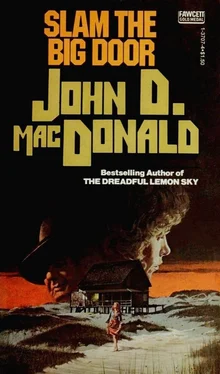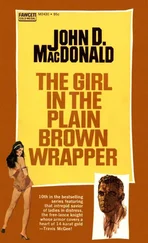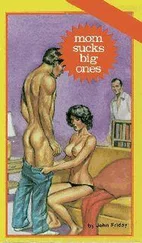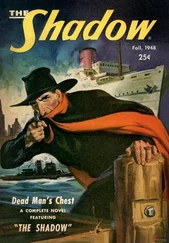John MacDonald - Slam the Big Door
Здесь есть возможность читать онлайн «John MacDonald - Slam the Big Door» весь текст электронной книги совершенно бесплатно (целиком полную версию без сокращений). В некоторых случаях можно слушать аудио, скачать через торрент в формате fb2 и присутствует краткое содержание. Город: Greenwich, Год выпуска: 1960, ISBN: 1960, Издательство: Fawcett Gold Medal, Жанр: Современная проза, на английском языке. Описание произведения, (предисловие) а так же отзывы посетителей доступны на портале библиотеки ЛибКат.
- Название:Slam the Big Door
- Автор:
- Издательство:Fawcett Gold Medal
- Жанр:
- Год:1960
- Город:Greenwich
- ISBN:978-0-449-13707-9
- Рейтинг книги:3 / 5. Голосов: 1
-
Избранное:Добавить в избранное
- Отзывы:
-
Ваша оценка:
- 60
- 1
- 2
- 3
- 4
- 5
Slam the Big Door: краткое содержание, описание и аннотация
Предлагаем к чтению аннотацию, описание, краткое содержание или предисловие (зависит от того, что написал сам автор книги «Slam the Big Door»). Если вы не нашли необходимую информацию о книге — напишите в комментариях, мы постараемся отыскать её.
Before the story is done, the pulse has run wild...
Slam the Big Door — читать онлайн бесплатно полную книгу (весь текст) целиком
Ниже представлен текст книги, разбитый по страницам. Система сохранения места последней прочитанной страницы, позволяет с удобством читать онлайн бесплатно книгу «Slam the Big Door», без необходимости каждый раз заново искать на чём Вы остановились. Поставьте закладку, и сможете в любой момент перейти на страницу, на которой закончили чтение.
Интервал:
Закладка:
The “o” on the old portable was printing solid. He opened the lid, picked the goo out of the “o” with a matchstick, lit a cigar and continued the letter, typing with four fingers, working — in a special sense — at his trade, taking comfort in the familiar sound, the cigar angled well to port to keep the smoke out of his eyes, a stocky man — very much alone.
Three
On the nineteenth day of April, on that sleepy Sunday afternoon while the residents and their guests on the north end of Riley Key used the beach and each other’s houses and cabañas, with a customary stop at the Jamison’s, and drank, and played bridge and tennis, and did a little surf casting and went out in their boats, and discussed the weather, property values, segregation, the vice president, local sexual intrigues, diets, investments, and where to go in Nassau and Varadero, and while they made their vague arrangements about ending up in one group or another at the Key Club, later on, four men, thirty-five miles away in another county, were deciding the financial future of Troy Jamison.
They had met, by prearrangement, at Purdy Elmarr’s ranch, twelve hundred acres, part of it bordering the upper Myakka River. The old frame ranch house was set back about three hundred feet from State Road 982, at the end of a straight sand road bordered by squat elderly oaks. The infrequent tourist who braved the potholes of 982 could look at the old house with the oak hammock beyond it, and the old trucks and implements corroding away in the side yard, and the gray, soiled-looking Brahman cattle feeding in the flat pasturelands between the scrub pine lands and the overgrown irrigation ditches, and see a certain picturesqueness in a down-at-the-heel ranch with rickety sheds, swaybacked roofs, weatherworn paint. If they jolted by shortly after the rural delivery truck, they might see Purdy Elmarr himself trudging out to his roadside box, a wiry old man in dusty work clothing, with a big shapeless black felt hat, steel-rimmed glasses — and feel that pleasant pity which is born of a sure knowledge of superiority. Poor old fella.
They could have no way of knowing that Purdy lived exactly the way he wanted to live, that no matter how frequent his visits to his bank in Sarasota, wearing his drab city-suit and an old cloth cap with a long visor, the executive staff of the bank leaped to attention, and became excessively affable — a social and professional gesture that never elicited a shadow of response.
He had a good riding horse and a pack of Blue Tick hounds, and two high-stake poker evenings a week. He got his turkey and quail and deer every year. At sixty-six he was in perfect health, and drank one full tumbler of prime bourbon whisky every night of his life. His granddaddy, a drover out of Georgia, had homesteaded a big chunk of land and bought more, ranch land and Gulf land and Key land and bay frontage. His daddy, with very little fuss or notoriety, had acquired a lot more. It had been simpler for them to get it, hang on to it and make a profit off it. Purdy had to use the services of a sharp firm of attorneys and accountants. He had control of about twelve corporations, but he wasn’t confused. He could read a financial statement with the same ease — and almost the same degree of pleasure — with which most men would read a dirty limerick. He drove a six-year-old car, listened to a twelve-year-old radio, underpaid his help, was generous with his friends, knew almost to the penny what he was worth at all times, and hated to see a month go by without adding to it. He was in citrus and celery, cattle and securities, motels and shipping, dredges and draglines, shopping centers and auto agencies. But the basis of all of it was land. He loved land with almost the same degree of intensity as he loved money.
He knew more about other men than they were ever able to learn about him. He knew the flaws and strengths and habits and vulnerabilities of every long-term resident in three counties who had a net worth of over twenty-five thousand dollars. Those men could be divided into three categories. There were those who had never had any dealings with Purdy. To them he was a mysterious, powerful, slippery old coot. Then there were those who had gone in with him on something and tried to get fancy and had got thoroughly stung. To them he was a vicious, crooked, merciless old bastard. Others had gone in with him and let him call the turn, and taken their profit. To that last group, Purdy was the salt of the earth.
The four men sat in comfortable old wicker chairs on the wide front porch of the ranch house. Purdy Elmarr was the eldest. Rob Raines was the youngest, twenty-seven, a solidly built young man with a small mustache who had the manner of earnest reliability of the ambitious young lawyer. (A manner which, he had begun to suspect, was not helping him at all in his program of re-seduction of Debbie Ann.) On this day, in this place, he was so full of deference as to hover dangerously close to obsequiousness. He had the wind-and-weather look of the sailing enthusiast. After much thought he had worn a necktie, which he now knew was a mistake, but it was too late to take it off. It was his first invitation to the ranch. He sensed that his career was balanced on the sultry edge of this idle afternoon — and here it would be determined whether, in the far golden years, he would become Judge Raines, a figure of dignity, solemn with wealth — or ole Robby Raines, that lawyer fella they say had a real good chance and muffed it that time, back when old Purd Elmarr was still alive, making deals. Rob Raines wondered whether he had poured too much or too little bourbon into his glass. As the idle talk went on, with nobody coming to the point, he was getting more instead of less nervous.
It seemed as though J. C. Arlenton would drone on forever. He was Buddha fat, pink-bald, with little short thick hands and feet. He wore khaki pants and a white shirt and carpet slippers, and he had driven out in a Cadillac that was as dirty as any car Raines had ever seen. Rob knew he had been in the state legislature one time, a long time ago, and since then had shoved a couple of governors into office. He had a lot of grove land over in Orange County, and a good-sized building-supply business, and he was known to be in a few things with Elmarr. One of them was the regular poker session.
J. C. Arlenton sat hugging his glass with his little thick hands and said in a tone of complaint to the fourth man present, Corey Haas, “Now Corey, damn it, you know better’n to set right there telling me Wink Haskell ever had one dollar put into Sea-Bar Development. Wink, he never went into nothing without control and that was the reason how he lost out here and there, and Sea-Bar was one he lost out on, so don’t you let him suck you in hinting on like how he had him a fine thing there, because Wink, he’s like to do that way to you, proving how smart he is. When Sea-Bar sold that whole tract to Mackel, ole Wink didn’t get one dime on account he wasn’t in it, so don’t let him hint you different.”
“Have it your way, J. C.,” Corey Haas said indifferently. “You’ve been down on Wink ever since he crossed you on that zoning thing and ever’body knows it.”
Corey Haas was, in this matter, Rob Raines’s ticket to join the discussion. Corey had thrown Rob a little bit of legal work lately. Of the four, Corey was the only one who wasn’t a native Floridian, but he had come down from West Virginia so long ago there wasn’t any perceptible difference in speech or manner. He’d lost a land-boom fortune so big that he’d spent the rest of his life trying to catch up to where he once had been. There were some who’d said he’d made it all back. He liked to get in on land syndicates. And he was in with Troy Jamison on Horseshoe Pass Estates.
Читать дальшеИнтервал:
Закладка:
Похожие книги на «Slam the Big Door»
Представляем Вашему вниманию похожие книги на «Slam the Big Door» списком для выбора. Мы отобрали схожую по названию и смыслу литературу в надежде предоставить читателям больше вариантов отыскать новые, интересные, ещё непрочитанные произведения.
Обсуждение, отзывы о книге «Slam the Big Door» и просто собственные мнения читателей. Оставьте ваши комментарии, напишите, что Вы думаете о произведении, его смысле или главных героях. Укажите что конкретно понравилось, а что нет, и почему Вы так считаете.












